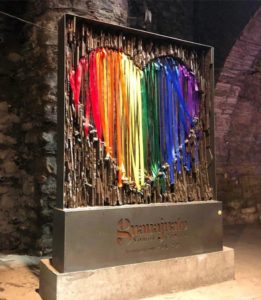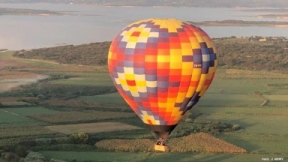Travel expert says Guanajuato is an LGBTQ+ friendly destination
News Category: News, Community News, and General Discussion
-
Published October 3rd, 2021. By Paul J. Heney
Mexico’s coasts are gorgeous, and Mexico City is a glamorous, dynamic, and bustling city, but there’s much more to the country in its interior. A recent trip to Guanajuato state, about 100 miles northeast of Mexico City, offered me some real insight into the region, after more than a dozen trips to the coastal areas. The state’s international airport, located between Leon and the capital city of Guanajuato, has direct flights from Chicago, Houston, Dallas, and several California cities.
Perhaps the best-known cities here are Guanajuato City and San Miguel de Allende (an hour to the east), which has seen a huge influx of American retirees in recent years. San Miguel is said to be one of the prettiest cities in Mexico, as well as a popular LGBTQ+ destination, so I was eager to check it out, even more so than Guanajuato City.
But while I loved both cities, my preconceived notions of them — Guanajuato City being more a spread-out metropolis and San Miguel being nestled in the mountains — were completely reversed from the reality.-
Guanajuato City
I arrived in Guanajuato City just before midnight, sleepy after a delayed flight. As we drove into the city’s center, I was astonished by the miles of gorgeous arched tunnels we passed through. It felt like we were driving through some alternative version of the Parisian catacombs, bits of the city peeking out above us every now and then. The following morning, I awoke to a sight that had me wondering if I was actually in Spain or Italy. Church steeples were set close against a backdrop of tight hills, dwellings spilling up and down the terrain in every direction, residences as colorful as those you might find on a Caribbean island.
Guanajuato City is that tightly packed, magical town I thought San Miguel would be. Eclectic, bustling, with impossibly small winding alleys, to discover (more than 3,500!), some so close that legend has it, secret lovers kissed nightly from their balconies — in buildings on opposite sides of the street.

The city is extremely welcoming, with rainbow heart banners everywhere proclaiming, “Somas Capital Incluyente,” meaning, “We are the inclusive capital.” A large heart-shaped sculpture, festooned with ribbons the colors of the rainbow, sits on the sidewalk in one of the arched underground tunnels, and I saw multiple people, from friends to families, queue in line to have their photos taken next to it.
The city was originally built when silver was discovered nearby and it has since flourished. In fact, the underground tunnel network is created from the original river streams that were used impressed into the processing of silver. Guanajuato City is incredibly walkable and features 12 squares, each with a fountain — these served as ways for residents upon the hillsides to come to get their water each day. Make sure to check out the architecture of the stunning Teatro Juarez theater, the Basilica of Our Lady of Guanajuato, and the Hidalgo Market, with ironwork designed by Gustave Eiffel.
San Miguel de Allende
Meanwhile, San Miguel de Allende is a more international city, with many foreign visitors and a large population of artists. It dates to 1555 and was initially a military post to protect the nearby travel routes. The architecture here reflects more of a southern Spanish style, with mostly one- and two-story houses — they generally contain a central courtyard with a water fountain.
The main church, Parroquia de San Miguel Arcángel, was built in 1880 after the earlier, baroque one was destroyed in a fire. This newer one was inspired by European architecture and is neo-Gothic. Like Paris’ Eiffel Tower, residents initially disliked the church, but it has grown to be the city’s symbol over the years and now is much beloved. Its pink “wedding cake” towers can be seen from much of the city.
On the outskirts of town, the Dos Búhos vineyard is one of only two organic wineries in the country and produces some delicious wines, including Cabernet Sauvignon, Moscata Giallo, Sauvignon Blanc, Cabernet Franc, and Tempranillo. There’s a lovely tasting room and the grounds are great to wander through with a glass of red in hand. There are also tours and occasional festivals — when we were there, they had live music and a variety of passed appetizers, specifically paired to the tasting.
I’ve ridden hot air balloons in the Napa Valley and Albuquerque, arguably two of the most scenic locations for such a ride. Add San Miguel de Allende to that list. The valley is perfect for this sublime early morning pleasure, and the hour-long ride gave us a great overview of the area, from downtown’s architecture to the surrounding hills and nearby La Begoña, an extensive lake that borders the metro area.
I felt extremely safe in both cities, both in the traditional sense as well as a COVID-specific one. Everyone wore face masks, even walking down the street. Every hotel, restaurant, museum, etc. had someone in the doorway to dispense antibacterial gel into your hands and then take your temperature. No COVID test was required to enter Mexico, but I did need a negative test within 72 hours of my return to the United States to be allowed back home.
Most of the hotels in both cities tend toward smaller boutique properties, and you’re more apt to find spas and luxury properties in San Miguel de Allende. The region is looking to grow more in the LGBTQ+ romance and adventure segments, as well as to promote its wineries, microbreweries, museums, and history. There’s a lot to like here — and a lot to discover. One trip wasn’t nearly enough to sample all of Guanajuato state’s charms.


Leave a Reply